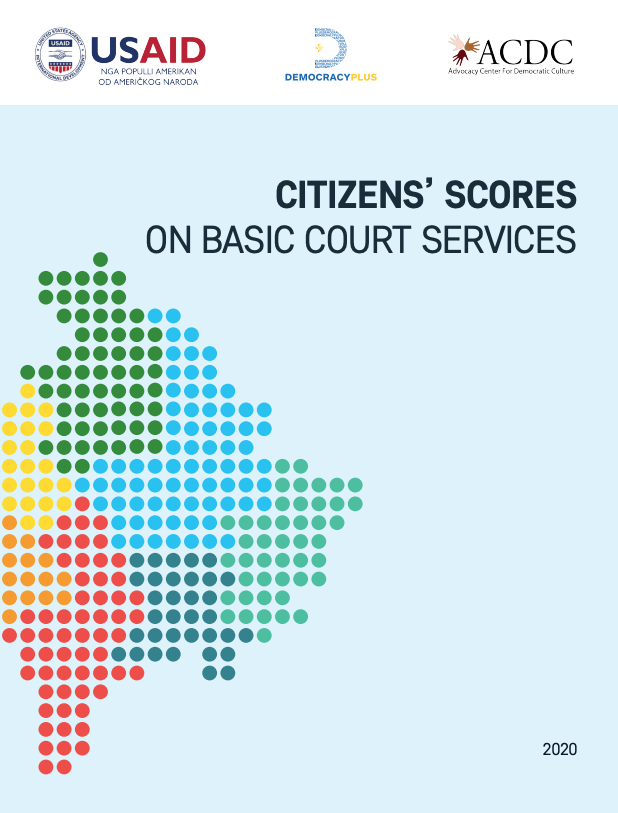Basic Court of Prishtina
Basic Court of Prizren
Basic Court of Mitrovice
Basic Court of Peje
Basic Court of Gjilan
Basic Court of Gjakova
Basic Court of Ferizaj
Select Basic Court

Reports

01/04/2020
QUALITY OF SERVICES PROVIDED BY KOSOVO BASIC COURTS – AS EVALUATED BY LAYWERS
Download
SummaryCITIZENS’ SCORES ON BASIC COURT SERVICES
Some of the key findings were: The majority of court users at each of Kosovo’s seven Basic Courts indicated that it was easy to access information about their cases; The majority of court users at each basic court claimed that the information received from the courts was somewhat helpful or very helpful; The overwhelming majority court users at each Basic Court thought that it was very easy to find the courtroom or office they sought inside the courthouse; Most court users at each Basic Court did not know if there were complaint boxes at the court’s premises; Both surveyed court users and focus group discussion (FGD) participants confirm that there are information desks at each Basic Court, but FGD participants indicated that the information desks were often unattended; The overwhelming majority of court users from both the majority and non-majority communities do not use the court’s website as a source of information; Court users from non-majority communities claimed that courts’ websites are translated to their native language, but the quality of translation must be improved etc.
QUALITY OF SERVICES PROVIDED BY KOSOVO BASIC COURTS – AS EVALUATED BY LAYWERS
Some of the key findings were: Access to information about Basic Court cases was still a challenge for 54% of the lawyers surveyed, who found it difficult to get the information they need; The most common sources of case information for lawyers were court administration and judges (48% of responses); 60% of the lawyers surveyed do not speak to the judges about their cases; Court websites were not a prime source of information for lawyers – 62% of those surveyed did not use them, while many who tried to use them are not successful in their searches for information; 45% of the lawyers were either unaware of the existence of complaint boxes in courthouses or claimed they were never installed (17%); Almost 70% of those surveyed did not notice improvements in access to information compared to the previous year; 41% of respondents believed that transparency had improved at the Basic Courts; Only 19% of lawyers claimed that the Basic Courts have become more efficient in case handling and through automation etc.
QUALITY OF SERVICES PROVIDED BY KOSOVO BASIC COURTS
This survey was designed and conducted by Democracy Plus to obtain citizens insight on the performance of the seven Basic Courts in Kosovo. Commissioned by Justice System Strengthening Program (JSSP), the survey aims to provide information to courts for improving their efficiency and reputation among citizens. The results can also serve as a measurement tool of the quality of services across the seven Basic Courts. This research is intended for Basic Courts, Kosovo Judicial Council. and all other bodies within the judicial system in Kosovo. It intends to identify gaps in the three areas and improve efficiency and better information of court users.
QUALITY OF SERVICES PROVIDED BY KOSOVO BASIC COURTS
Some of the key findings were: One quarter of respondents claimed that it is very hard to find information about their cases; The majority of respondents claim that the information provided by the court is helpful (50.67%); 65.9% of attorneys do not use the court website as a source of information, and of those who do, 53.74% do not find what they were looking for; Generally, lawyers who participated in the survey claim that they are able to get court business done in a reasonable amount of time; According to respondents, most of the civil cases take 12-24 months to be decided by Basic Courts from the moment the case is filed until the final verdict; According to respondents, most of the criminal cases take 6-12 months to be decided by Basic Courts from the moment the case is filed until the final verdict; The predominant reasons why hearings are delayed, according to respondents, is the absence of the other party, and procedural errors by the court; Lawyers receive hearing notices 2 weeks in advance most of the time etc.


